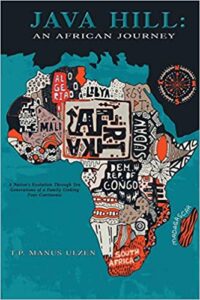Title: Java Hill: An African Journey: A Nation’s Evolution Through Ten Generations of a Family Linking Four Continents
Author: T.P. Manus Ulzen
Publisher: Diamond Media Press Co
ISBN: 978-1-951302-21-4
Pages: 202
Genre: History
Reviewed by: David Allen
Hollywood Book Reviews
 There are many inspiring lessons in this book, which brims with history, life, and feeling. One lesson is that lineages and dynasties don’t necessarily end with the brutal imposition of slavery and other displacements. Rather, as in the present case, it is sometimes possible – gloriously possible – to reconnect the threads of family and heritage through careful sifting of historical and even verbal records.
There are many inspiring lessons in this book, which brims with history, life, and feeling. One lesson is that lineages and dynasties don’t necessarily end with the brutal imposition of slavery and other displacements. Rather, as in the present case, it is sometimes possible – gloriously possible – to reconnect the threads of family and heritage through careful sifting of historical and even verbal records.
T.P. Manus Ulzen – doctor, husband, father, educator, and author of the present volume, takes us on a fact- and emotion-filled journey across four continents and through four or more centuries to trace his family origins back to Africa and to Dutch settlers of Ghana. Some of these settlers later emerged as African soldiers in the East Indies, many of whose descendants now live in Europe and North America.
The journey, fraught with struggle and capitulation to exigency, with pride and also with dignity, is an education in miniature. It is an object lesson in self-discovery for any who have embarked on similar explorations of personal and family past, and a primer on how to do family archeology right. Dr. Ulzen’s ‘extended family’, including his actual relatives and a host of informants and like-minded specialists, have pitched in, collaborating on this work of love and reclamation. One among the veins of gold mined in this exploration is the multiplex origin of the name ‘Ulzen’ – a name shared by white Dutch nationals as well black ‘Dutchmen’ in Africa and around the world today.
The book is a treasure trove of information, of legacy, and of self-discovery. The depredations of slavery were well known to this country (historically Elmina, a once-‘thriving’ slave outlet on the west coast of Africa, now present-day Ghana.) The centerpiece of the memoir is the life, funeral, and anniversary of the death of the author’s father.
This book represents the actual work of getting back to the roots – and a gorgeous, living display, in many colors, of the threads of history and culture. It took at least ten years to write, fermenting in the rich soil of the writer’s personal travel, curiosity, and accumulated insight. Interestingly, the patriarchal society depicted in Africa in years past doesn’t necessarily rankle – only because that society had its matriarchal side as well. (Certain rites and customs were only meant to be performed by women.)
This is an engrossing read, a fascinating cross-cultural and truly global, truly cosmopolitan book.

